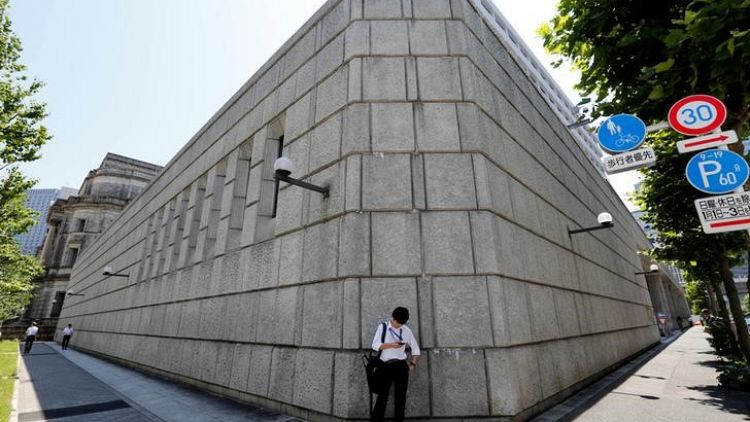By Leika Kihara and Kaori Kaneko
TOKYO (Reuters) - Japan's central bank is facing fresh challenges as it struggles to hit its ambitious inflation target, with planned cuts in mobile phone charges and education fees expected to weigh on consumer prices in coming years.
While most of the distortions will be transitory, they could slow price growth to a halt and make it harder for the Bank of Japan to convince the public that inflation will accelerate towards its elusive 2 percent inflation goal.
Data on Thursday showed Japan's core consumer inflation was steady at 1.0 percent in October, with half the gain driven by higher energy costs.
Recent oil price falls mean the boost to inflation from energy costs will start to taper off soon, and will start to weigh on price growth early next year.
Inflation could thus lose support from energy costs at a time downward pressure from various one-off factors kick in.
The biggest impact would come from government pressure on Japan's major carriers to cut mobile phone charges.
Carrier giant NTT Docomo Inc 9437.T said last month it would cut mobile charges by up to 40 percent in April-June next year. Rivals like KDDI Corp 9433.T and SoftBank Group Corp 9984.T could follow suit.
The government estimates a 40 percent drop in charges could push down core consumer inflation by 0.96 percentage point.
"Falling contributions from energy and mobile charge cuts could turn core consumer inflation negative around spring next year," said Junichi Makino, chief economist at SMBC Nikko Securities, who expects inflation to hit zero next fiscal year.
In its latest forecasts made in October, the BOJ expected core consumer inflation to hit 1.4 percent in the next fiscal year beginning in April 2019 and 1.5 percent the following year.
Government plans to make education more affordable could also weigh on prices ahead.
As part of last year's election campaign pledge, premier Shinzo Abe has promised to make pre-school education free for all 3-5 year olds and 0-2 year olds from low-income households. Full implementation will start in October.
That will push down the fees consumers pay for education, which is incorporated into consumer price index (CPI) data.
The government expects the move to push down overall CPI by 0.3 point next fiscal year, a drag some analysts warn could extend through fiscal 2020.
Abe also plans to cut university tuition for low-income households from April 2020, which will also weigh on CPI.
Taken together, the education initiatives could push down core CPI by up to 0.9 point, said Hiroshi Miyazaki, senior economist at Mitsubishi UFJ Morgan Stanley.
To be sure, lower mobile phone charges and education costs could help accelerate inflation in the long run by giving households more purchasing power.
Still, many analysts expect the overall impact on inflation to be negative. BofA Merrill Lynch cut next year's core consumer inflation forecast to 0.5 percent, citing the one-off factors.
BOJ officials say they will look through one-off factors and focus on price moves that reflect the economy's fundamentals.
That means a slowdown in inflation figures alone won't trigger an immediate expansion of already massive monetary stimulus.
But soft price growth could delay an exit from ultra-loose policy despite the rising cost of prolonged easing, such as the hit to financial institutions' profits from near-zero rates. The BOJ is already seen lagging well behind other central banks in unwinding crisis-mode stimulus.
"While the drop in the CPI caused by wireless and education price cuts is not a reflection of fundamental inflation trends, it will still deliver a slowdown in observed inflation," BofA Merill Lynch said in a research note.
"Since Japan's inflation expectation formation is adaptive (backward-looking), the BOJ may be concerned that 'negative price shocks' would lower household inflation expectations, keeping the board on hold."
(Reporting by Leika Kihara; Editing by Kim Coghill)



